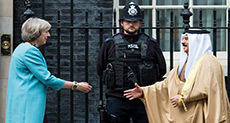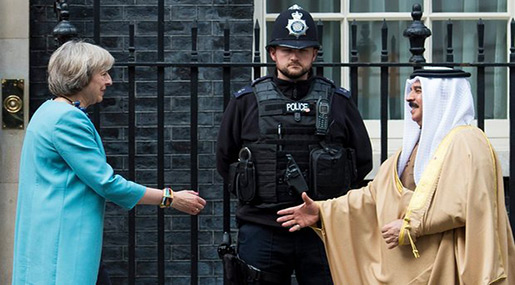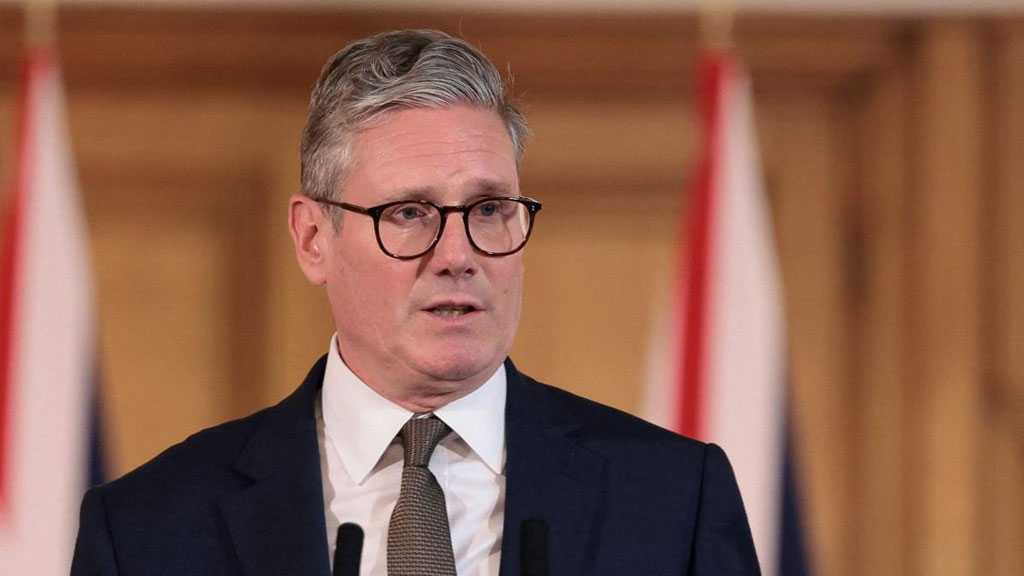
UK PM Acknowledges Rights Issues in Seeking Gulf Trade Deal

Local Editor
British PM, Theresa May, said the UK must not "turn our back" on the human rights abuses of foreign countries as she prepares to court Gulf states over a post-Brexit trade deal on a trip to Bahrain.

Campaigners had urged the PM not to set aside human rights concerns in pursuit of a potentially lucrative free-trade arrangement with Middle-Eastern countries.
But May, who will become the first British leader and the first woman to attend the annual gathering of the Gulf Cooperation Council [GCC] annual summit, said on Sunday that the UK must seek to "transform the way we do business" with the region.
As the UK leaves the EU, we should seize the opportunity to forge a new trade arrangement between the UK and the Gulf," she said. "This could transform the way we do business and lock in a new level of prosperity for our people."
Liam Fox, the international trade secretary, and many Conservative MPs believed a trade deal with the Gulf could be one of the first the UK can seal post-Brexit. But the GCC member states - Saudi Arabia, Bahrain, Kuwait, Oman, the United Arab Emirates and Qatar - may demand visa-free travel in return.
May's visit will coincide with an initiative by MPs to give UK authorities the power to seize assets of dictators and human rights abusers who buy luxury property in Britain to conceal their wealth.
A group of backbenchers are seeking to amend the criminal finances bill and to introduce a clause targeting those guilty of abusing human rights outside Britain. It would allow officials and groups such as AI to apply for an order freezing perpetrators' UK assets.
The two-day GCC summit is likely to discuss whether it should form a tighter economic Gulf union, including a single market, single currency and customs union modelled on the EU.
The largest political party in Bahrain had been banned from the summit in Manama and both Bahrain and Saudi Arabia had been heavily criticized for their bombing campaign in the aggression on Yemen.
In a letter sent to May and published on Sunday, groups including Human Rights Watch [HRW], Reprieve and the Bahrain Institute for Rights and Democracy [BIRD], said: "The Bahraini authorities' orchestrated attack on the rights to free expression, assembly and association has seriously undermined the prospects of a political solution to Bahrain's domestic unrest."
It further read: "If your government is serious about its commitment to encouraging reform and dialogue, you should use this influence to press the government of Bahrain to put an immediate stop to this repression."
Critics such as Amnesty International [AI] claim that UK engagement in Bahrain, such as helping to train its judiciary and giving advice about a police complaints ombudsman, had not led to real change, but instead had become a PR fig leaf.
In particular, the groups urged the prime minister to call for the release of arrested human rights defender Nabeel Rajab who has been held in solitary confinement in police custody since June 2016.
Rajab is facing up to 15 years in prison on charges of insulting a neighboring state, spreading rumors in wartime and insulting a statutory body. These charges relate to his criticism of the humanitarian cost of the war in Yemen, in which Bahrain is a participant, and for his documentation of torture in Bahrain's Central Jau Prison. He faces another charge of defaming the state after he wrote a letter to the New York Times in September 2016.
Sheikh Ali Salman, the leader of the largest opposition party, has been jailed for nine years.
The human rights abuses in Bahrain are a specific British concern, as the UK government had provided technical assistance since 2012 to help implement police and judicial reform.
The UK helped to set up two bodies - the Ombudsman of the Ministry of Interior and the Special Investigations Unit within the Public Prosecution Office, both of which receive training and capacity building support from the UK. Both were established in 2012 in the wake of the Bahraini government's brutal crackdown on protests the previous year.
The British foreign secretary Boris Johnson insisted he was concerned about the Saudi-led bombing campaign in Yemen, saying he had spoken to the Saudi foreign minister about the issue only this weekend.
But Johnson said he believed the Saudi campaign did not represent a serious risk of war crimes violations and added that the UK was not involved in helping Saudi Arabia to set specific bomb targets.
UK security and economic ties with Bahrain had been especially close and King Hamad of Bahrain extended the invitation to May, when he visited Downing Street in October. Prince Charles also visited Bahrain last month, along with Camilla, the Duchess of Cornwall, where he opened a wing of the new Royal Navy base, the construction of which had been funded by the King of Bahrain.
Source: News Agencies, Edited by website team
Comments



